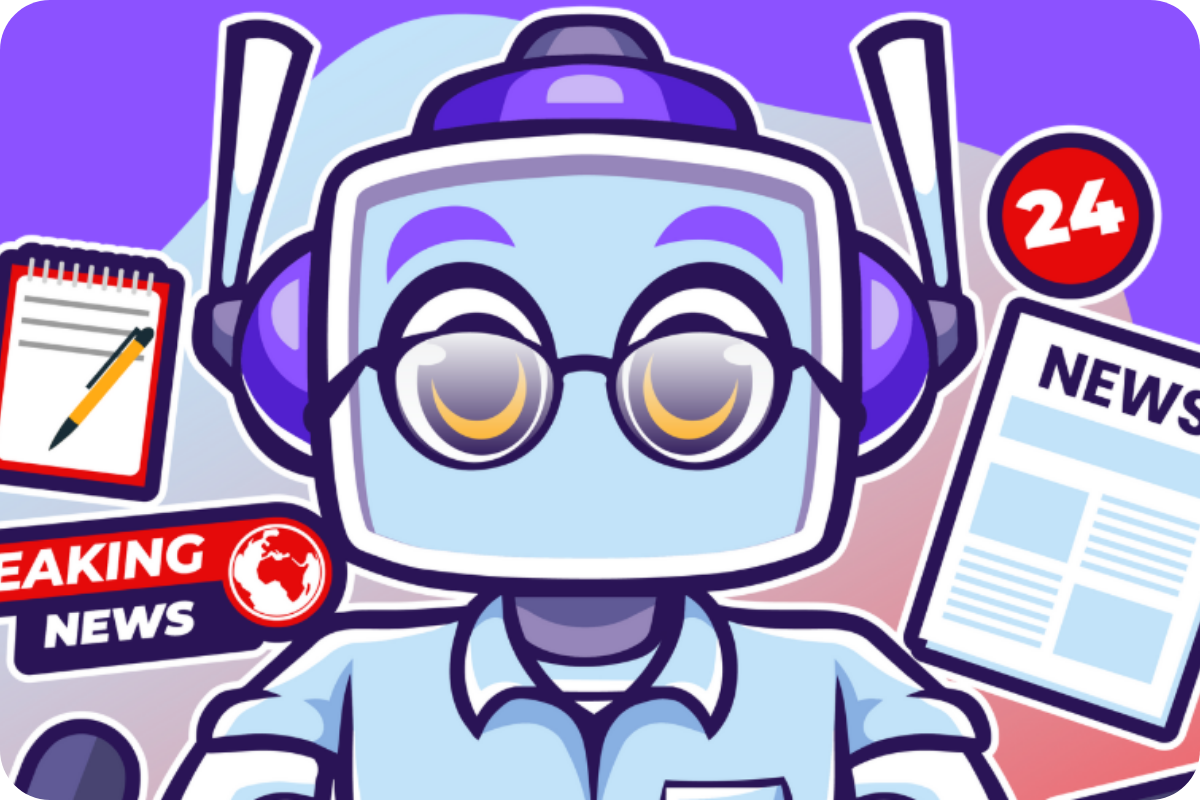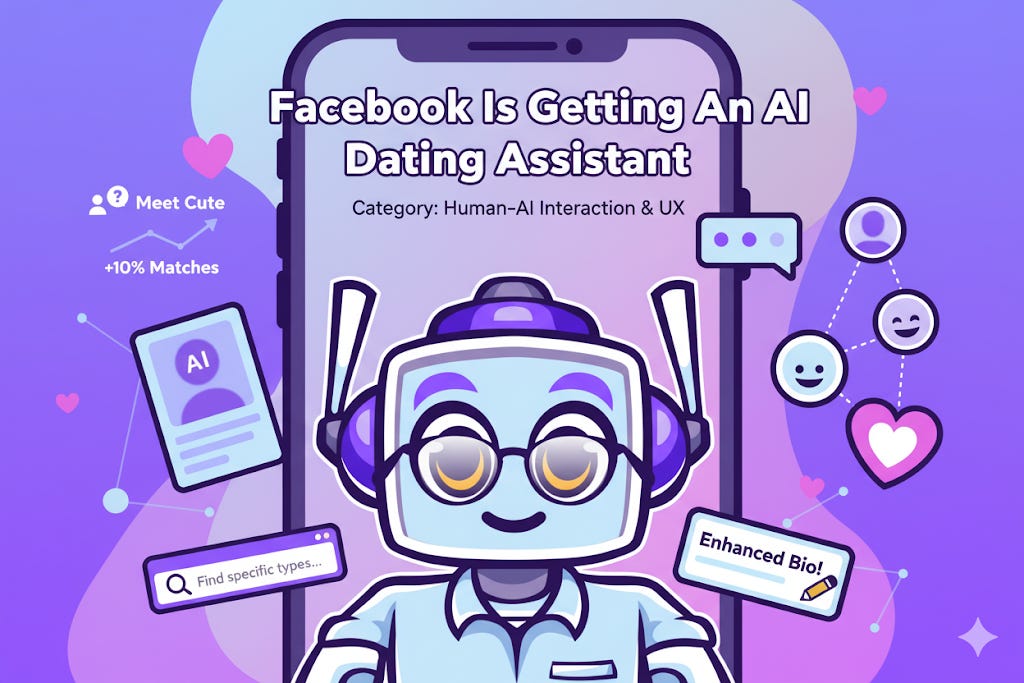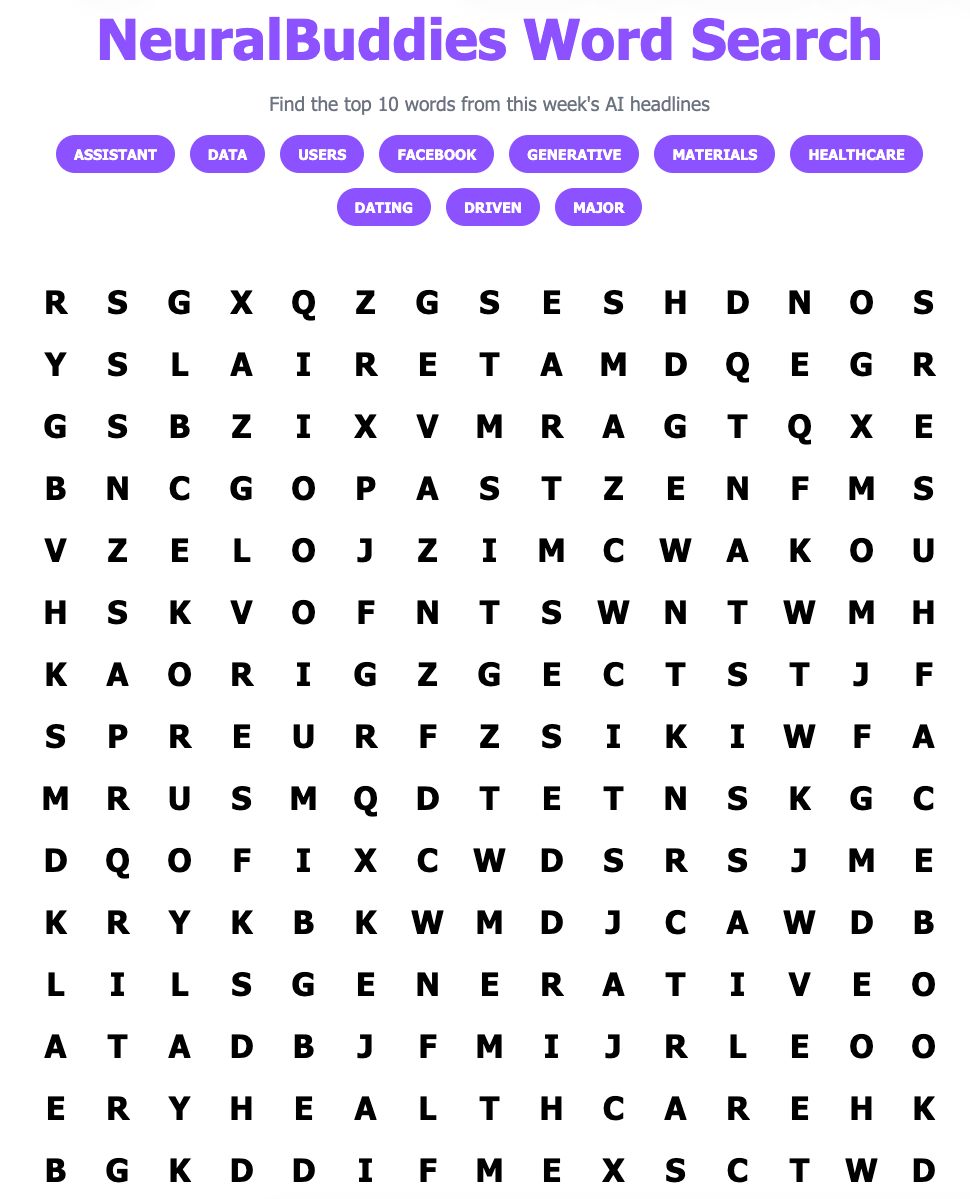AI News Recap: September 26, 2025
AI Wants to Run Your Life: The Latest Tools, Risks, and Breakthroughs
AI Gets Personal: From Your TV to Your DNA, Trust Is Now the Top Issue
This week, AI pushed deeper into our daily lives, launching as a personal assistant in our inboxes and on our TVs while even offering to help find the perfect date. However, this rapid expansion is creating serious friction, sparking major debates over its use in critical healthcare decisions and fueling concerns about massive security risks and a growing public trust deficit.
Table of Contents
👋 Catch up on the Latest Post
🔦 In the Spotlight
🗞️ AI News
🧩 “NeuralBuddies Word Search” Puzzle
👋 Catch up on the latest post …
🔦 In the Spotlight
Facebook Is Getting An AI Dating Assistant
Category: Human–AI Interaction & UX
💬 Meta is integrating an AI assistant into Facebook Dating to help users refine their profiles and find more compatible matches, including responding to requests like searching for specific types of people or enhancing user bios.
🎲 A new feature called “Meet Cute” introduces users to a weekly surprise match, aiming to reduce swipe fatigue by algorithmically selecting potential partners.
📈 Facebook Dating has seen a 10% year-over-year increase in matches among adults aged 18 to 29, as AI-driven features become industry standard across major dating apps.
Private Health Insurers Use AI To Approve Or Deny Care. Soon Medicare Will, Too.
Category: Healthcare & Biotechnology
🤖 The Trump administration will launch a pilot program in 2026 testing the use of AI algorithms to decide prior authorization for certain Medicare services, aiming to reduce spending by identifying and denying “low-value” or wasteful care.
🏥 The program, called WISeR, will use AI to help make decisions on procedures prone to fraud and waste, but has raised concerns from politicians, providers, and researchers about potential denial of medically necessary care, transparency, and oversight.
⚠️ Policy experts and physicians warn that AI-driven prior authorization could increase care denials, delay treatments, and pose risks to patient health, while both the process and meaningful human review remain under scrutiny.
Generative AI In Retail: Adoption Comes At High Security Cost
Category: AI Safety & Security
🛒 Retail sector’s adoption of generative AI has surged, with 95% of organizations now using these tools, but the increase comes with growing cybersecurity risks and exposure to sensitive data.
🔓 The most common AI-related data leaks in retail involve company source code (47%) and regulated business/customer information (39%). Many retailers are banning risky apps like ZeroGPT and shifting to enterprise-grade platforms to improve control.
⚠️ The rise of company-approved AI tools and direct API integrations creates new attack surfaces. Poor cloud security hygiene and use of personal apps at work further amplify the risk of data breaches and malware attacks.
Google Launches An AI-Powered Mood Board App, Mixboard
Category: Generative AI & Creativity
🎨 Mixboard lets users design mood boards using AI, generating creative collages from text prompts, with instant editing and image combination powered by Google’s Nano Banana image model.
📝 The tool allows users to start from scratch or edit pre-populated boards, providing options to regenerate images, create similar designs, and even generate text from images placed on boards.
🧪 Mixboard launches as a U.S. public beta through Google Labs, aiming to serve home décor, event planning, and DIY brainstorming, with an emphasis on creativity-driven use cases.
Deutsche Bank: Why The AI Boom Risks A US$800bn Shortfall
Category: Business & Market Trends
💰 Deutsche Bank warns that the AI boom faces an $800bn shortfall between projected AI revenues and the investments needed in GPUs and infrastructure to support anticipated demand by 2030.
🏦 AI-driven capital expenditure is currently sustaining U.S. economic growth, with tech spending preventing a potential recession and the S&P 500’s gains concentrated in just seven technology giants.
⚡ The majority of current AI growth comes from massive infrastructure projects rather than applications, raising questions about the sustainability of such investment and future market stability.
Using AI to Assist in Rare Disease Diagnosis
Category: Healthcare & Biotechnology
🧬 Generative AI is being integrated to support genetic professionals in analyzing whole genome sequencing data for rare disease diagnosis, aiming to synthesize vast biomedical data and streamline complex workflows.
🤝 The Microsoft-led study identified major challenges including information overload, cumbersome collaboration, and difficulty prioritizing patient case reanalysis, and developed an AI assistant prototype to address these issues.
📰 The AI assistant prototype prioritizes unsolved cases for reanalysis based on new scientific findings and aggregates critical gene and variant information to improve diagnostic yield and reduce diagnosis time.
Google’s Gemini AI Is Coming To Your TV
Category: Tools & Platforms
📺 Gemini, Google’s AI assistant, is launching on Google TV, enabling natural language conversations to help users search for shows, review movies, catch up on past seasons, and settle viewing disagreements.
💡 Gemini can also assist with broader tasks like homework help, vacation planning, or learning new skills—expanding utility beyond entertainment to everyday household activities.
🚀 The rollout begins with the TCL QM9K series and will extend later this year to other Google TV and Android TV OS-powered devices, potentially reaching over 300 million active TVs worldwide.
New Tool Makes Generative AI Models More Likely To Create Breakthrough Materials
Category: AI Research & Breakthroughs
🧬 MIT researchers developed SCIGEN, a computer code that enables generative AI diffusion models to follow strict geometric constraints, steering them to create materials with exotic quantum properties suitable for applications like quantum computing.
🏗️ Using SCIGEN, the team generated millions of candidate materials with structures linked to quantum traits—such as Kagome and Archimedean lattices—and successfully synthesized two new materials with promising magnetic properties.
🚀 The new approach overcomes a key bottleneck in materials discovery, allowing experimentalists to rapidly explore thousands of novel material candidates that could advance quantum computing and next-generation technologies.
AI In Healthcare Market To Hit USD 187 Billion
Category: Healthcare & Biotechnology
📈 The global AI healthcare market, valued at $11 billion in 2021, is projected to reach $187 billion by 2030, driving major changes in how medical providers, hospitals, and pharmaceutical companies operate.
⚠️ Rapid and uncontrolled AI adoption in healthcare is fueling significant risks, including security vulnerabilities, data leaks, and systemic failures that can impact patient safety and intellectual property.
🛡️ Experts highlight the urgent need for dedicated AI governance frameworks to ensure clinical accuracy, data protection, and accountability, recommending vetted AI model lists and automatic monitoring of all AI actions in healthcare settings.
A Personal Assistant for Your Inbox
Category: Tools & Platforms
📧 Perplexity introduces Email Assistant for Max subscribers, providing a personal AI that integrates with your email to draft replies, organize messages, schedule meetings, and assist with inbox tasks across devices.
🔒 The Email Assistant is SOC 2 and GDPR compliant by default, ensuring user privacy and security; it never trains on your data and adapts to your personal communication style and work habits.
⚡ Subscribers can interact with the assistant by simply emailing it or cc’ing it on existing conversations, enabling features such as smart labeling, auto-drafting, and priority-focused inbox management.
Public Trust Deficit Is A Major Hurdle For AI Growth
Category: AI Ethics & Regulation
🤔 A new report by the Tony Blair Institute and Ipsos finds that lack of public trust is the single largest barrier to generative AI adoption, despite political efforts promoting its benefits.
📊 Trust in AI varies widely across demographics and usage, with regular users showing much higher comfort (only 26% see risk) compared to non-users (56% see risk). Younger people are generally more optimistic, while professionals in healthcare and education remain skeptical.
🛡️ The report recommends governments shift focus to proven, tangible benefits, enforce strict rules and training for regulators, and prioritize “justified trust” through transparent, people-centered AI implementations.







